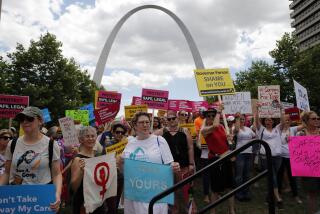Louisiana Judge Throws Out State Ban on Gay and Lesbian Marriages
HOUSTON — A judge Tuesday threw out an amendment to the Louisiana Constitution banning gay marriage, a ruling applauded by civil rights advocates but dismissed by social conservatives as a temporary hitch in their campaign to limit the legal rights of gay and lesbian couples.
State District Judge William Morvant said the Louisiana Legislature, which wrote the amendment this spring before voters overwhelmingly approved it in September, had failed to make it narrow enough.
According to state law, constitutional amendments are valid only if they have a single legal purpose. This one, Morvant ruled, had two: The first was to ban gay marriage. The second was to ban civil unions and domestic partnerships. Morvant said the second ban was accomplished with this sentence: “A legal status identical or substantially similar to that of marriage for unmarried individuals shall not be valid or recognized.”
That phrasing was not contained in early drafts of the amendment. It was added during legislative debate at the behest of lobbyists who wanted to go beyond a gay marriage ban, said Evan Wolfson, executive director of Freedom to Marry, a nonprofit group that works nationwide for “marriage equality.”
“The Christian Coalition got greedy,” he said. “You know the old saying. Pigs get fat. Hogs get slaughtered.”
Michael Johnson, an attorney for the Alliance Defense Fund, a nonprofit group that opposes gay marriage, said Morvant’s decision would be appealed.
Gene Mills, executive director of the Louisiana Family Forum, another group fighting to ban gay marriage, said he “fundamentally disagreed” with the judge’s decision. He described it as a minor setback.
“This is the third quarter, late in the game,” Mills said. “We anticipated opposition in the legislative process and we overcame it there. We anticipated opposition at the pre-amendment level and we overcame it there. We’ve got to play a whole other quarter of ball. And we think we will be successful in the end.”
Gay rights supporters had argued that the amendment was unnecessary because Louisiana already had a law banning gay marriage. But opponents argued that without a constitutional amendment, gays could attempt to “export” marriages from other states to Louisiana.
If that happened, Mills said, institutions such as churches and schools would be forced to accept homosexuality. And the public, he argued, would be forced to underwrite the costs of gay relationships, including AIDS. While heterosexual relationships can result in children, he said, “you don’t get the equivalent in a homosexual relationship.
“You get disease,” Mills said.
Nearly 78% of voters in Louisiana supported the amendment, one of 13 similar measures states are weighing this fall. Socially conservative leaders and Christian organizations pushed the measures onto the ballots, saying they felt threatened this year when the Massachusetts Supreme Court said it could find no “constitutionally adequate reason” to block same-sex couples from marrying.
Many of the state measures will appear on the same Nov. 2 ballot as the presidential election, something analysts said could help President Bush by drawing more conservative voters to the polls.
Randy Evans, an attorney representing a Louisiana gay rights group called Forum for Equality, acknowledged that the judge’s ruling was narrow and unlikely to hinder efforts to pass similar measures in other states.
Missouri voters approved an amendment banning same-sex marriage this year. Measures are on the November ballots in Arkansas, Georgia, Kentucky, Michigan, Mississippi, Montana, North Dakota, Ohio, Oklahoma, Oregon and Utah. Most if not all are expected to succeed.
But Evans predicted that the judge’s decision will send civil rights advocates in other states scrambling to see if they can bring legal challenges on similar grounds. And, he said, it will “give a boost to people around the country who are fighting these same amendments.”
Wolfson said he believed the judge’s ruling would be the first in a line of decisions reinforcing “the basic constitutional mandate of equality for all.” But if it survives legal challenges, he said, Louisiana’s amendment will throw out thousands of existing agreements between adults who are not married, such as wills, documents rendering power of attorney and documents allowing hospital visits.
“At least for a time,” Wolfson said, “families in Louisiana are going to be spared this harsh discrimination, which punishes kids and puts an obstacle in the path of couples seeking to care for one another.”
More to Read
Sign up for Essential California
The most important California stories and recommendations in your inbox every morning.
You may occasionally receive promotional content from the Los Angeles Times.











